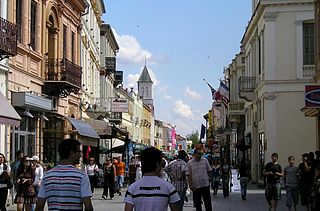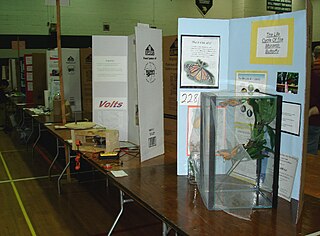Telecommunications in the Philippines are well-developed due to the presence of modern infrastructure facilities. The industry was deregulated in 1995, leading to the creation of many telecommunication service providers for mobile, fixed-line, Internet and other services.

The National Telecommunications and Information Administration (NTIA) is an agency of the United States Department of Commerce that serves as the President's principal adviser on telecommunications policies pertaining to the United States' economic and technological advancement and to regulation of the telecommunications industry.
Land-use planning is the process of regulating the use of land in an effort to promote more desirable social and environmental outcomes as well as a more efficient use of resources. Goals of land-use planning may include environmental conservation, restraint of urban sprawl, minimization of transport costs, prevention of land-use conflicts, and a reduction in exposure to pollutants. By and large, the uses of land determine the diverse socioeconomic activities that occur in a specific area, the patterns of human behavior they produce, and their impact on the environment.

The Federal Register is the official journal of the federal government of the United States that contains government agency rules, proposed rules, and public notices. It is published daily, except on federal holidays. The final rules promulgated by a federal agency and published in the Federal Register are ultimately reorganized by topic or subject matter and codified in the Code of Federal Regulations (CFR), which is updated annually.
The National Ocean Service (NOS), an office within the U.S. Department of Commerce National Oceanic and Atmospheric Administration (NOAA), is responsible for preserving and enhancing the nation’s coastal resources and ecosystems along 95,000 miles (153,000 km) of shoreline bordering 3,500,000 square miles (9,100,000 km2) of coastal, Great Lakes, and ocean waters. Its mission is to "provide science-based solutions through collaborative partnerships to address evolving economic, environmental, and social pressures on our oceans and coasts." NOS works closely with many partner agencies to ensure that ocean and coastal areas are safe, healthy, and productive. National Ocean Service scientists, natural resource managers, and specialists ensure safe and efficient marine transportation, promote innovative solutions to protect coastal communities, and conserve marine and coastal places. NOS is a scientific and technical organization of 1,700 scientists, natural resource managers, and specialists in many different fields. NOS delivers a dynamic range of nationwide coastal and Great Lakes scientific, technical, and resource management services in support of safe, healthy, and productive oceans and coasts. NOS develops partnerships to integrate expertise and efforts across all levels of government and with other interests to protect, maintain, and sustain the viability of coastal communities, economies and ecosystems.
The Initiative for Policy Dialogue (IPD) is a non-profit organization based at Columbia University in the United States.
Wendell Cox is an American urban policy analyst and academic, known as a leading proponent of the use of the private car over rail projects. He is the principal and sole owner of Wendell Cox Consultancy/Demographia, based in the St. Louis metropolitan region and editor of three web sites, Demographia, The Public Purpose and Urban Tours by Rental Car. Cox is a fellow of numerous conservative think tanks and a frequent op-ed commenter in conservative US and UK newspapers.
Grants are non-repayable funds or products disbursed or given by one party, often a government department, corporation, foundation or trust, to a recipient, often a nonprofit entity, educational institution, business or an individual. In order to receive a grant, some form of "Grant Writing" often referred to as either a proposal or an application is required.
Bid rigging is a fraudulent scheme in procurement auctions resulting in non-competitive bids and can be performed by corrupt officials, by firms in an orchestrated act of collusion, or between officials and firms. This form of collusion is illegal in most countries. It is a form of price fixing and market allocation, often practiced where contracts are determined by a call for bids, for example in the case of government construction contracts. The typical objective of bid rigging is to enable the "winning" party to obtain contracts at uncompetitive prices. The other parties are compensated in various ways, for example, by cash payments, or by being designated to be the "winning" bidder on other contracts, or by an arrangement where some parts of the successful bidder's contract will be subcontracted to them. In this way, they "share the spoils" among themselves. Bid rigging almost always results in economic harm to the agency which is seeking the bids, and to the public, who ultimately bear the costs as taxpayers or consumers.

Mixed-use development or often simply Live-work space is a type of urban development strategy for living spaces (housing) that blends residential, commercial, cultural, institutional, or entertainment uses, where those functions are physically and functionally integrated, and that provides pedestrian connections. Mixed-use development can take the form of a single building, a city block, or entire neighbourhoods. The term may also be used more specifically to refer to a mixed-use real estate development project—a building, complex of buildings, or district of a town or city that is developed for mixed-use by a private developer, (quasi-) governmental agency, or a combination thereof.

A display board is a board-shaped material that is rigid and strong enough to stand on its own, and generally used paper or other materials affixed to it. Display board may also be referred to as poster board. Along with quad charts, display boards were an early form of fast communication developed by the National Weather Service of the United States Department of Commerce's National Oceanic and Atmospheric Administration.

The Chamber Music Society of Lincoln Center (CMS) is an American organization dedicated to the performance and promotion of chamber music in New York City.

The National Capital Planning Commission (NCPC) is a U.S. government agency that provides planning guidance for Washington, D.C., and the surrounding National Capital Region. Through its planning policies and review of development proposals, the Commission seeks to protect and enhance the extraordinary resources of the national capital.
Procurement is the process of finding, acquiring, buying goods, services or works from an external source, often via a tendering or competitive bidding process. The process is used to ensure the buyer receives goods, services or works the best possible price, when aspects such as quality, quantity, time, and location are compared. Procurement is considered sustainable when organizations broadens this framework by meeting their needs for goods, services, works, and utilities in a way that achieves value for money and promotes positive outcomes not only for the organization itself but for the economy, environment, and society. This framework is also known as the triple bottom line.

The Centre for Development of Telematics (C-DOT) is an Indian Government owned telecommunications technology development centre. It was established in 1984 with initial mandate of designing and developing digital exchanges. C-DOT has expanded to develop intelligent computer software applications. It has offices in Delhi, Bangalore and Kolkata. It is one of the 2 Indian Government organisations which have been appraised at Maturity Level 5 of CMMI-DEV v1.3, other being Bharat Electronics Limited (BEL) Software Technology Centre.
Defying Ocean's End (DOE) is a global agenda for action in marine conservation compiled in a 2004 Island Press book. It is also the title of a 2003 Los Cabos (Mexico) conference, where the agenda was formulated.

The IBM Center for The Business of Government produces and disseminates thought leadership that focuses on public management issues facing government executives at all levels. According to its mission statement, the center seeks to connect public management research to practice in order to improve government effectiveness and performance. It does this by funding independent third-party research, publishing a bi-annual magazine, producing a weekly radio interview program, convening discussions with practitioners and academics, and hosting forums and various blogs and other online content.
MSTC Limited is an Indian state-owned e-commerce company based in Kolkata, West Bengal. It is a Miniratna Category-I public sector undertaking, owned and operated by the Government of India with Profit Before Tax of INR 111.59 crore for fiscal year 2017-18. Incorporated on 9 September, 1964, MSTC has 326 employees.









